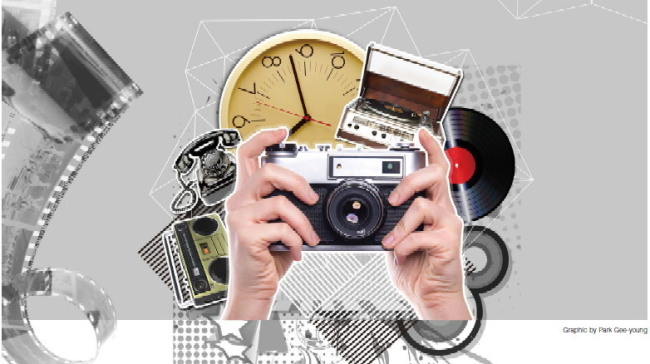[Weekender] Analog’s allure in a digitized world
In a highly connected society swamped by hand-held digital devices, more and more people are harking back to simpler times.
By Korea HeraldPublished : April 17, 2015 - 19:27
In this digital age, the word analog has taken on new meanings.
In a highly connected society swamped by hand-held digital devices, more and more people are harking back to simpler times. Times when electronic devices were not “smart” and the word application usually meant a paper document to be submitted when seeking an academic or professional position.
This sense of longing has led to all things “old” being referred to as “analog” in Korea, and has given rise to the term “analog sensibilities.”
The term has come to be used as an umbrella term for anything that is old or reminiscent of bygone times.
The phrase fills reviews of Korean films and television series set any time before 2000, and everything from cameras to items of clothing is described as “analog” or as “stimulating the analog senses.”

The term, and its usage, may make little literal sense but the phenomena it describes is very real.
“I know old people are supposed to say that things were better in the old days, and maybe I am just getting old, but I do miss the old days,” a 45-year-old self-employed man surnamed Park said, adding that his children are “unable to be children.”
“People know more these days but I feel that we don’t even have the time to think or to appreciate things as much as we should because digitalization has made everything so easily accessible.”
To the ire of his wife, Park said that he spends too much time trying to play with his children “like children” and reminiscing about when he was a child.
His reminiscing has led to him seeking out “analog” establishments and objects that take him back in time, such as cafes decorated in the style of the 1970s, second hand books and vinyl records.
Aided by such sentiments, toys such as Lego and model kits of robots from the Japanese animation series Gundam have not only endured the test of time but are regaining popularity even among adults.
The appeal the old ways has is not limited to the tastes of the individual.
There are examples of product design being influenced by this yearning for the past such as LG Electronics’ CRT TV that is designed like the boxy televisions from before the digital revolution.
In addition to personal tastes, the analog syndrome has even influenced education ― the biggest obsession of and seemingly the most important element of Koreans’ lives.
With concerns rising that early exposure to digital devices could cause attention span problems in children, the analog is also making a comeback in education.
One such old school education tool being revived is the abacus, known as “jupan” in Korean.
Attending abacus lessons after school was once a must for many children but the practice had fallen out of favor over the years to the point that many in their 20s only have a vague idea about how to use the “analog calculator.”
However, the abacus’ supposed effect on increasing concentration and the ability to think logically is now filling the seats at “jusan” institutes.
Along with the abacus, the game Go is also regaining popularity as a tool for boosting children’s concentration.
Often taking hours to play a single game, the game is perhaps as analog as something can be.
By Choi He-suk (cheesuk@heraldcorp.com)
In a highly connected society swamped by hand-held digital devices, more and more people are harking back to simpler times. Times when electronic devices were not “smart” and the word application usually meant a paper document to be submitted when seeking an academic or professional position.
This sense of longing has led to all things “old” being referred to as “analog” in Korea, and has given rise to the term “analog sensibilities.”
The term has come to be used as an umbrella term for anything that is old or reminiscent of bygone times.
The phrase fills reviews of Korean films and television series set any time before 2000, and everything from cameras to items of clothing is described as “analog” or as “stimulating the analog senses.”

The term, and its usage, may make little literal sense but the phenomena it describes is very real.
“I know old people are supposed to say that things were better in the old days, and maybe I am just getting old, but I do miss the old days,” a 45-year-old self-employed man surnamed Park said, adding that his children are “unable to be children.”
“People know more these days but I feel that we don’t even have the time to think or to appreciate things as much as we should because digitalization has made everything so easily accessible.”
To the ire of his wife, Park said that he spends too much time trying to play with his children “like children” and reminiscing about when he was a child.
His reminiscing has led to him seeking out “analog” establishments and objects that take him back in time, such as cafes decorated in the style of the 1970s, second hand books and vinyl records.
Aided by such sentiments, toys such as Lego and model kits of robots from the Japanese animation series Gundam have not only endured the test of time but are regaining popularity even among adults.
The appeal the old ways has is not limited to the tastes of the individual.
There are examples of product design being influenced by this yearning for the past such as LG Electronics’ CRT TV that is designed like the boxy televisions from before the digital revolution.
In addition to personal tastes, the analog syndrome has even influenced education ― the biggest obsession of and seemingly the most important element of Koreans’ lives.
With concerns rising that early exposure to digital devices could cause attention span problems in children, the analog is also making a comeback in education.
One such old school education tool being revived is the abacus, known as “jupan” in Korean.
Attending abacus lessons after school was once a must for many children but the practice had fallen out of favor over the years to the point that many in their 20s only have a vague idea about how to use the “analog calculator.”
However, the abacus’ supposed effect on increasing concentration and the ability to think logically is now filling the seats at “jusan” institutes.
Along with the abacus, the game Go is also regaining popularity as a tool for boosting children’s concentration.
Often taking hours to play a single game, the game is perhaps as analog as something can be.
By Choi He-suk (cheesuk@heraldcorp.com)
-
Articles by Korea Herald




![[Herald Interview] 'Amid aging population, Korea to invite more young professionals from overseas'](http://res.heraldm.com/phpwas/restmb_idxmake.php?idx=644&simg=/content/image/2024/04/24/20240424050844_0.jpg&u=20240424200058)












![[KH Explains] Korean shipbuilding stocks rally: Real growth or bubble?](http://res.heraldm.com/phpwas/restmb_idxmake.php?idx=652&simg=/content/image/2024/04/25/20240425050656_0.jpg&u=)

